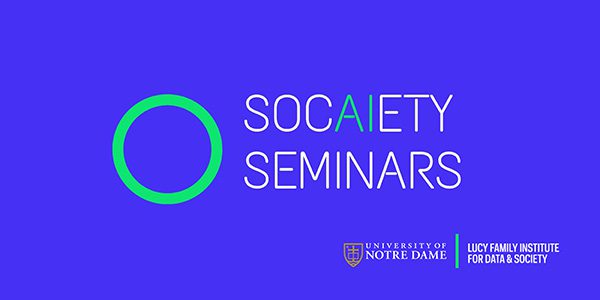Literature & Film in Lockdown – Boccaccio, “The Decameron” (Introduction & First Story)
Subscribe to the ThinkND podcast on Apple, Spotify, or Google.
Featured Speakers:
- Susan Ohmer, The William T. and Helen Kuhn Carey Associate Professor of Modern Communication, University of Notre Dame
- Kieron Webb, Head of Conservation, British Film Institute
- Rev. Jim Lies C.S.C., Director for Academic Initiatives & Partnerships, University of Notre Dame, London, England
The second session of Literature and Film in Lockdown focused on Boccaccio’s “Decameron”, a work written following the Black Death, a plague that took the lives of ⅓ – ½ of the population of Western Europe. The session was presented by Barry McCrea, a Professor of English and the Donald R. Keough Family Professor of Irish Studies at the University of Notre Dame, and moderated by Lisa Caulfield, the Director of the Notre Dame Global Center at Kylemore Abbey. The introduction to “The Decameron” features an uncanny familiarity to the current coronavirus pandemic and the stories beg questions about survival during a plague, the celebration of human individuality, the structure of time, and the emergence of new leaders. The second session addressed these and other topics, while drawing comparisons between the experiences of participants and those of the characters in the novel.
McCrea again began the session with a brief overview of the text, identifying the key question addressed throughout the novel as one of survival. Lost social roles, and lost senses of the future, identity and togetherness are highlighted throughout the novel as the group of young people devise a plan to overcome and recreate what they have lost. Through electing a leader and establishing a social structure, the young people in the novel attempt to create a sense of normalcy and celebrate the human body in a time where it is seen only as a threat. The novel also celebrates the individuality of the human person by introducing a character who does not fit within the types of people identified in the introduction. McCrea wrapped up his presentation by highlighting that a plague changes people. Those that emerge from the experience are not the same people who entered into it.
After attending a breakout session designed to compare and contrast participant experiences with specific aspects of the novel, participants returned to the main session for a question and answer period facilitated by Caulfield. The first question highlighted the psychological effects of the frequent inability to have a funeral during a plague. McCrea cited many examples throughout history and literature that identify this traumatic experience, such as accounts from the Black Death and the Irish Famine, and discussed the risk of a pandemic in taking away human emotion and the individuality expressed by it. The questions then shifted to the structure that humans require to survive and how this was manifested in the actions of the characters throughout the novel. McCrea began by identifying the loss of time structure during lockdown. Putting structure into one’s day is very important to psychic survival, and McCrea highlighted the role religion can play in imposing this structure. Religion, sacraments and rituals serve to mark the passage of time throughout the year and can be employed to do the same for an individual day, as the characters in “The Decameron” modeled. The characters in the novel also created a social construct as soon as possible. They found that without a social order and a leader, they could not settle into their new life. The discussion members concluded that establishing structure despite isolation and lockdown is important to retain even a small sense of normalcy.
McCrea then responded to a question about nature by illustrating to the participants that humanity is not in control of nature. Because humans cannot control the creation and spread of a plague, they cannot control any other aspect of nature either. The discussion ended with a short comparison between the novel and the movie rendition of “The Decameron”, with McCrea concluding that the movie director simply chose to focus on only a few chapters of the original novel. McCrea left the participants with the final thought that “The Decameron” is a celebration. Though the characters in the book were faced with death and disease, they chose to celebrate the opposite of it: life and desire.
- Being removed from our normal lives makes what constitutes normality more visible. (6:37)
- The types of individual responses to a plague remain consistent over time, such as those who lock themselves away, obsess about health habits, ignore public health advice, etc. (7:22)
- A common experience that has surfaced during times of tragedy is the traumatization of not being able to dispose of the dead, celebrate their lives or mitigate grief by meeting with friends and family. (29:36)
- “The Decameron” brings back individuality, dignity, excitement, emotions and pleasures to the human body in a time when it is seen only as a vessel of contagion. (31:42)
- We are unable to live without a social structure and a routine to manage our time. Living through and emerging from a pandemic requires a reconstruction of social order and time structure. (35:45)
- “Boccaccio takes the predicament of living through a plague and turns it into an exploration of the human world.” (Barry McCrea, 6:09)
- “A stage of exceptionality makes normality somehow more visible.” (Barry McCrea, 6:48)
- “People after a plague are not the same as they were before. We see that a survivor is not the same person they were coming into the plague.” (Barry McCrea, 12:33)
- “The pandemic risks flattening everything and turning us all into the same thing, just into types, and our bodies just into bags of biological matter.” (Barry McCrea, 31:35)
- “The book is very troubled by the blurring of the boundaries between the human world and the natural world.” (Barry McCrea, 41:44)
- “Who’s in charge or what ideologies are reigning at the end of a pandemic are often not the ones that were there before. And in that sense, they create a kind of vacuum for certain types of leaders to emerge.” (Barry McCrea, 50:51)
- “When faced with death there is a desire to celebrate the opposite of it, which is life and desire, and that is a fundamental aspect of ‘The Decameron’.” (Barry McCrea, 55:55)
Related Content
Climate Change and The Limits of Narrative
Join the Kellogg Institute for the introductory session of a workshop refining Kellogg Faculty Fellow Roy Scranton’s draft book project “Ethical Pessimism: Climate Change and...
View EventReunion 2024
Alumni Education Programming Click each program title to learn more. To return to the Reunion 2024 website on my.nd.edu please click here. ND Perspectives: Election 2024 and the...
Read ArticleA Brave New World of AI Governance
Explore the connection between data, geopolitics and governance, regulation, self-regulation while discovering examples of good and bad practices in various sectors, such as...
View Event


